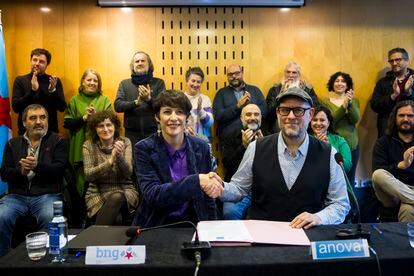Galician nationalism is facing transcendental elections in its history. It is the second time that the BNG faces regional elections leading the alternative to the PP ahead of the PSdeG-PSOE. The first was by Xosé Manuel Beiras more than 20 years ago, but then the popular party did not have a new candidate nor had they just emerged from a defeat in the general elections. In 2001 Manuel Fraga crowned the peak of his career in Galicia and José María Aznar governed Spain with an absolute majority. Now, with Ana Pontón as the headliner, the Bloc's expectations of presiding over the but he left the group in January 2012 to join forces with Yolanda Díaz.
Anova, the party founded by Beiras when he left the BNG and which was one of the pillars of the municipal tides that triumphed in Galicia in 2015, has signed a collaboration agreement with Pontón for the campaign that will start on February 2. It is not the first rapprochement between these two factions of Galician sovereignty that, until recently, were bitterly opposed. The historical nationalist formation, small in militancy but with very important political references, has already asked for the vote for the Bloc in the last general elections. The difference now is that reconciliation has been staged with a formal act, a resounding gesture with great symbolic weight for a nationalism that has experienced very difficult times since it lost the Xunta in 2009, with Alberto Núñez Feijóo as leader of the Galician PP. It is, on the other hand, a new blow for Sumar after Podemos slammed the door. Before the appointment of Marta Lois, Díaz proposed to Anova's national spokesperson, the former mayor of Santiago Martiño Noriega, to be his headliner on 18-F. This Sunday it was precisely Noriega who presided with Pontón over the signing of the agreement between both nationalist and left-wing parties.
The pact “has nothing to do with lists or distributions” and “this speaks very well of Anova and us,” sources from the BNG management emphasize to this newspaper. It is a formal political agreement in which Anova states that in the current context “what is urgent, what is necessary and what is useful” is to concentrate the vote on Pontón's candidacy. Do you suppose Beiras will participate in the Bloc's campaign events? “It is perfectly possible but we have not specified it yet,” respond the same sources from the Pontón team, who highlight the “willingness” of both forces to collaborate in the campaign in “various ways.”
From Anova they are made “at the disposal” of the Block. Noriega also does not rule out his or Beira's participation in electoral events, “but always respecting that it is the BNG campaign,” he emphasizes. Regarding the change that this approach to his former fellow militants represents after the breakup in 2012, the former Compostela councilor claims the “legacy” of the pacts that the nationalist Beiras sealed with the federal left of Izquierda Unida and Podemos during that great economic crisis : “Then Anova naturalized the different sensitivities that the left has in Galicia and yesterday [por el acto del domingo con el BNG] “We also put this on the table.”
The agreement that heals the wounds of left-wing Galician nationalism has been negotiated without leaks, without ever proposing an integration of Anova into the BNG and without the Beiras party demanding positions on the electoral lists, explain sources familiar with the process. These circumstances “generated a climate of trust” with which both forces have managed to leave behind the resentment due to past confrontations. The letter signed by Pontón and Noriega considers it “urgent” to place the Galician Government “at the service of national and class interests.” It calls for an end to the PP policies that, in the opinion of the BNG and Anova, have turned Galicia into a “barren wasteland serving benefits outside of those of the social majority and that put at risk our collective subsistence as a differentiated nation.” “Only with a determined commitment to self-government is it possible to reverse the current dynamic of cultural decline and economic dependence,” the document reads.
What affects the most is what happens closest. So you don't miss anything, subscribe.
Subscribe

The consequences that this reconciliation will have for Galician municipal politics are still unknown. Anova still shares acronyms in some town halls with Sumar's political space. It is part, for example, of Compostela Aberta, a confluence that has nourished Sumar Galicia with leaders and that is at the same time a government partner of the BNG in Santiago since last May, when those from Pontón took over the mayor's office of Santiago by first time in its history. Another symbolic victory that has reinforced optimism in the Bloc facing 18-F.
Noriega affirms that Anova will continue participating in the municipal candidacies of which it is a part in different parts of Galicia. “Our reference is local and is not going to change at the moment,” says the party's national spokesperson. Her “affections,” he adds, continue to be in Compostela Aberta, the confluence with which she reached the mayor's office of Santiago and from which the Sumar candidate on 18-F comes. This Monday, Lois downplayed the importance of the BNG and Anova alliance: “Sumar's strength is independent of political decisions [de otros partidos]”.
Subscribe to continue reading
Read without limits
_
#Galician #nationalism #reconciles #defeat #February